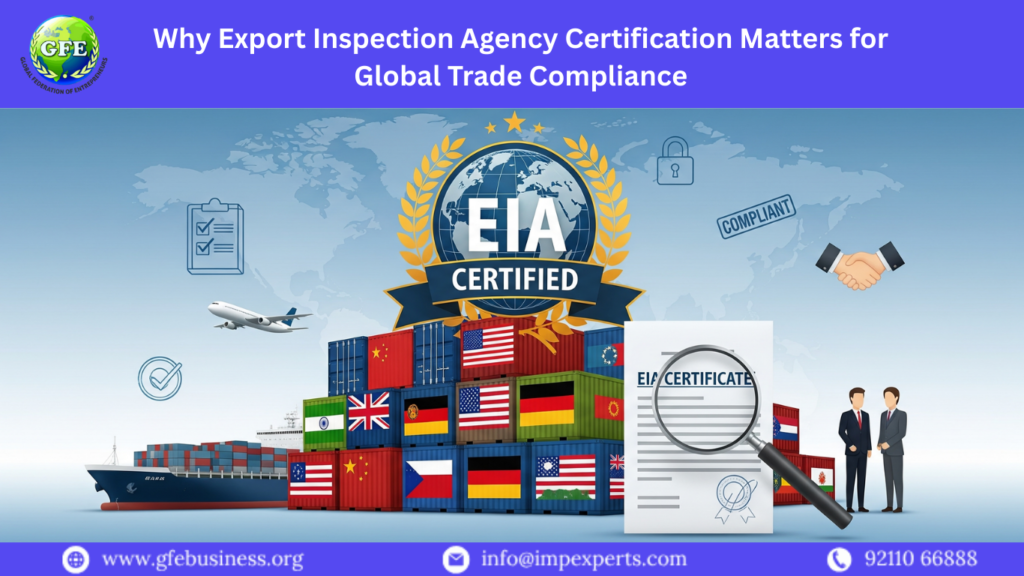
Why Export Inspection Agency Certification Matters for Global Trade Compliance
In the fast-paced world of international trade, compliance is not optional—it is the backbone of trust, reputation, and long-term growth. Businesses that want to build credibility with overseas buyers must adhere to quality and safety standards recognized worldwide. One of the most important certifications in this process is that offered by the Export Inspection Agency (EIA).
In India, the Export Inspection Council (EIC) operates through Export Inspection Agencies to ensure that goods leaving the country meet international requirements. Whether you are new to exports or already running an established trade business, obtaining certification from the EIA can make or break your global success story.
GFE Business helps entrepreneurs and businesses build a strong foundation in the import export sector by offering expert-led training and compliance guidance. Learn more at GFE Business.
What is the Export Inspection Agency (EIA)?
The Export Inspection Agency is an organization set up under the Export Inspection Council of India (EIC), functioning under the Ministry of Commerce and Industry. Its primary role is to ensure that all export products meet international quality standards, safety guidelines, and buyer specifications.
The EIA certification confirms that goods have been inspected and tested for compliance before shipment. This helps businesses:
Avoid rejections at foreign ports.
Build buyer trust with quality assurance.
Gain recognition in international markets.
Why EIA Certification Matters for Exporters
1. Global Market Access
Without EIA certification, many products cannot even enter regulated foreign markets such as the European Union, the USA, or Middle Eastern countries. Certification acts like a passport for your goods, ensuring seamless entry into these territories.
2. Boosts Buyer Confidence
International buyers prefer suppliers who are backed by credible certifications. EIA ensures that every shipment aligns with global standards, giving your buyers peace of mind and making them more likely to continue long-term partnerships.
3. Prevents Costly Rejections
Rejected shipments not only cost money but also damage your reputation. With EIA certification, your goods undergo stringent testing before leaving India, drastically reducing the risk of international rejection.
4. Compliance with Trade Regulations
Every country has strict import regulations. EIA certification ensures that your products comply with these rules, helping you avoid legal issues, fines, or blacklisting.
5. Improves Brand Image
Exporters with EIA certification signal quality, safety, and reliability. This professional image helps you stand out among competitors in global markets.
The Process of Getting EIA Certification
If you’re considering exporting, here’s a simplified breakdown of the process:
Application Submission – Exporters must apply to the relevant Export Inspection Agency.
Inspection of Goods – The agency inspects and tests the goods according to international quality benchmarks.
Testing in Accredited Labs – Samples are analyzed in approved laboratories for compliance.
Issuance of Certificate – Once the goods meet all requirements, the EIA issues a certificate authorizing export.
This certificate becomes an essential document while clearing customs and entering foreign markets.
Sectors That Need EIA Certification
EIA certification applies to a wide range of industries, including:
Agriculture & Food Products (spices, rice, seafood, processed foods).
Textiles & Garments.
Leather Products.
Engineering Goods.
Chemicals & Pharmaceuticals.
Each sector has unique testing parameters, but all share one goal: delivering safe, high-quality goods to international buyers.
Common Challenges Exporters Face
Even though EIA certification is essential, many exporters face hurdles such as:
Lack of awareness about mandatory certification requirements.
Delays in documentation and inspection processes.
Failure to meet international quality benchmarks due to lack of training.
Financial losses caused by rejected shipments.
This is why proper guidance and training in global trade compliance are crucial.
How GFE Business Helps Exporters
At GFE Business, we provide practical solutions for businesses entering or scaling in the global trade sector. Our training programs cover:
Step-by-step guidance on export documentation.
Understanding compliance requirements like EIA certification.
Strategies for preventing shipment rejection.
Trade finance, logistics, and market entry planning.
With expert-led sessions, you can avoid costly mistakes and ensure your business is fully prepared to meet international standards.
Final Thoughts
In today’s competitive global marketplace, exporters cannot afford to ignore compliance. EIA certification is not just a legal requirement—it is a competitive advantage that helps you expand into new markets, win customer trust, and safeguard your brand.
Want to learn how to start your import export business the right way and stay compliant with EIA certification?
Visit www.gfebusiness.org and get expert-led training that prepares you for real-world trade.